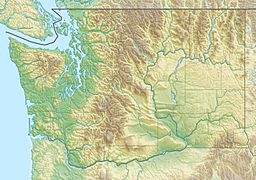Upper Melakwa Lake facts for kids
Quick facts for kids Upper Melakwa Lake |
|
|---|---|
| Location | King County, Washington, United States |
| Coordinates | 47°27′09″N 121°28′14″W / 47.452612°N 121.470650°W |
| Primary outflows | Pratt River |
| Basin countries | United States |
| Surface elevation | 4,508 ft (1,374 m) |
Upper Melakwa Lake is a small, beautiful lake found in King County, Washington state, in the United States. It is known for being the starting point, or "source," of the Pratt River.
Contents
Discover Upper Melakwa Lake
Upper Melakwa Lake is a hidden gem in the mountains. It's a peaceful spot that offers a glimpse into the natural beauty of the Pacific Northwest. Even though it's small, it plays an important role in the local environment.
Where Is This Lake?
This lake is located high up in the mountains, a little bit higher than another lake called Melakwa Lake. Think of it as the "upper" part of a two-lake system. Both lakes are found within the large Mount Baker-Snoqualmie National Forest. This forest is a huge protected area in Washington state.
How to Reach the Lake
Getting to Upper Melakwa Lake is an adventure! Most people first hike to Melakwa Lake. From there, you can continue walking a short distance upstream to reach Upper Melakwa Lake. The path can be a bit challenging, so many hikers might feel tired after reaching the first lake. But if you keep going north from Upper Melakwa Lake, you will eventually reach a spot called Melakwa Pass. This pass offers amazing views of the surrounding mountains.
Nature Around the Lake
The area around Upper Melakwa Lake is part of a wild and natural environment. Because it is in a national forest, it is home to many different kinds of plants and animals. You might see tall evergreen trees, colorful wildflowers, and various types of wildlife. The clean, clear water of the lake supports small aquatic life. This ecosystem is important for the health of the entire region.
Protecting Our Wild Places
Upper Melakwa Lake is part of a protected area in King County, Washington. This means the land and water around the lake are kept safe from too much human development. Protecting places like this helps keep nature healthy. It ensures that animals have safe homes and that future generations can also enjoy these beautiful wild spaces.
Find Out More
 | Lonnie Johnson |
 | Granville Woods |
 | Lewis Howard Latimer |
 | James West |



